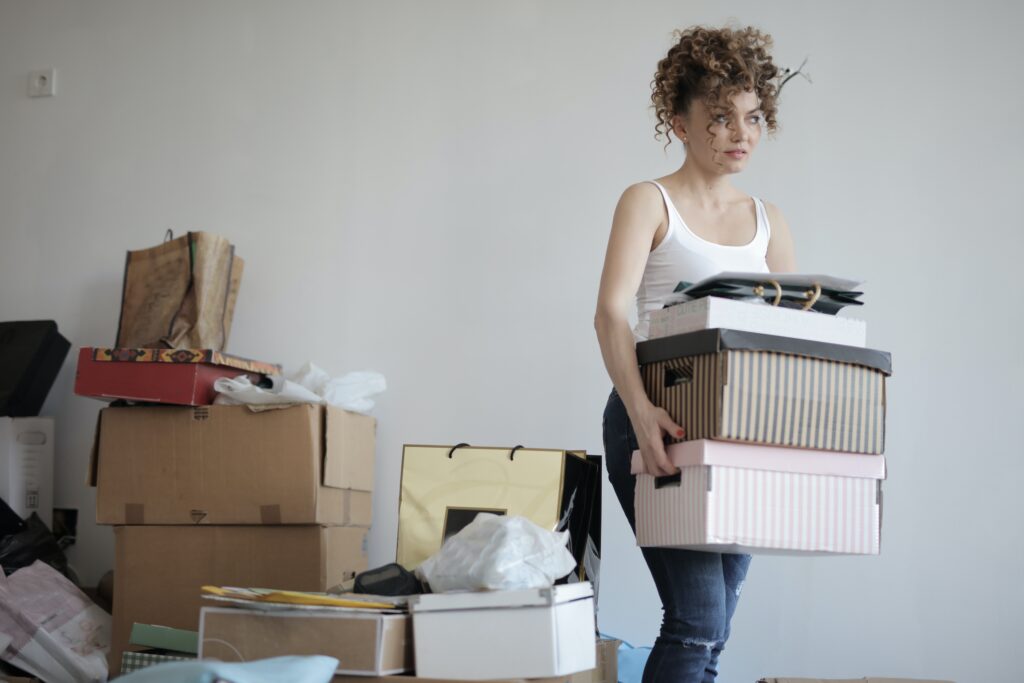The Roots of Clutter
We often associate clutter with a character flaw – e.g., some is too lazy to clean up their mess. However, there is an underlying psychology of clutter and disorganization that may keep someone from tidying up.
Some of the reasons someone may hold onto clutter include:
- They feel overwhelmed by their clutter – It’s often a big job to get rid of things, which can be both physically and mentally exhausting. In the short term, it just feels easier to keep things the same.
- Objects remind them of important things – People keep clothes that don’t fit anymore because they’re hoping to lose weight. They hang on to old brochures for cruises because they want to travel. However, keeping objects that remind you of your goals doesn’t make you any closer to achieving them.
- Objects have sentimental value – People keep objects from childhood that they associate with fond memories. For example, if a loved one passed away, it’s often hard to throw away their possessions.
- They are afraid to let things go – People often fear the feelings of guilt they might experience if they throw things away – especially if the object has sentimental value. A related fear is the idea of not being able to get something back once they get rid of it in case they need it later on.
- They find comfort in their possessions – People’s possessions, even if they don’t use them, often bring a sense of safety and security that can be painful to let go of.
All of these psychological factors tend to feed the growth of clutter over time. For individuals with ADHD, clutter can be especially troubling.
How Clutter Affects the ADHD Brain
One of the characteristics of ADHD is disorganization; because of issues with executive functioning that result in distractability and difficulty focusing, planning and organizing. This, combined with the psychological factors mentioned above, causes clutter to grow. Then, because of the clutter, ADHD symptoms of distractability and difficulty focusing increase. It’s a self-reinforcing negative cylce.
For an individual with ADHD, their sense of well-being can get snowed under all the clutter. Their cluttered environment increases stress. The idea of organizing can be overwhelming, and the temptation to procrastinate or avoid organizing seems to makes sense to them.
But with the right approach, you can eliminate clutter and get organized.
Tips for De-cluttering and Staying Organized
Below are some recommendations from experts about how to keep the clutter under control.
- Don’t buy things on impulse, and try never to buy “souvenirs” that you don’t need and aren’t going to use. Also, don’t accept items that someone gives you for free unless you absolutely want them.
- Strive to keep surfaces bare. Put away kitchen appliances you don’t use every day; don’t cram stuff onto every ledge.
- Don’t let newspapers and magazines pile up. Put them in the recycle as soon as possible.
- Identify a particular place for everything. This will allow you to find what you need easily and avoid having important papers such as bills scattered around everywhere.
- Deal with the piles that accumulate in the hallway, in corners, on bedside tables, on the dining room table. Seeing them there will more likely propel you to do something about them.
- Remember that storing a thing means you don’t need to use it. Before you squirrel something away, ask yourself, “Do I really need to keep this? If you have things that you’re reluctant to throw away because you’re not sure what they are, put them all in one box. You’ll never use the stuff, but you’ll know it’s there. It’s a good idea to put a date on the box, and if you haven’t opened it in a year, throw it away.
- Hang up your coat and other clothes, and have plenty of hangers in every closet.
- Make your bed every morning.
- Set aside a place or box where you put things to give away. Once you realize you want to get rid of something, that’s where it should go.
- When you undertake a major de-cluttering effort, take it one room at a time. That way it won’t seem so overwhelming.
- Consider getting a “body double” (partner) – either in person or virtual – to help you get started and keep you motivated.
- If you haven’t used, worn, or otherwise noticed something in a year, get rid of it.
The key to any de-clutter plan is to get started. Take it in small increments and turn your de-cluttering strategies into habits that become second nature.
References
- https://www.additudemag.com/declutter-home-organization-tips/
- https://www.healthline.com/health/adhd-and-messy
- https://www.verywellmind.com/decluttering-our-house-to-cleanse-our-minds-5101511
- https://psychcentral.com/adhd/ways-to-clear-ou
- https://www.healthyplace.com/self-help/adhd/adhd-and-clutter-5-tips-for-getting-organized



